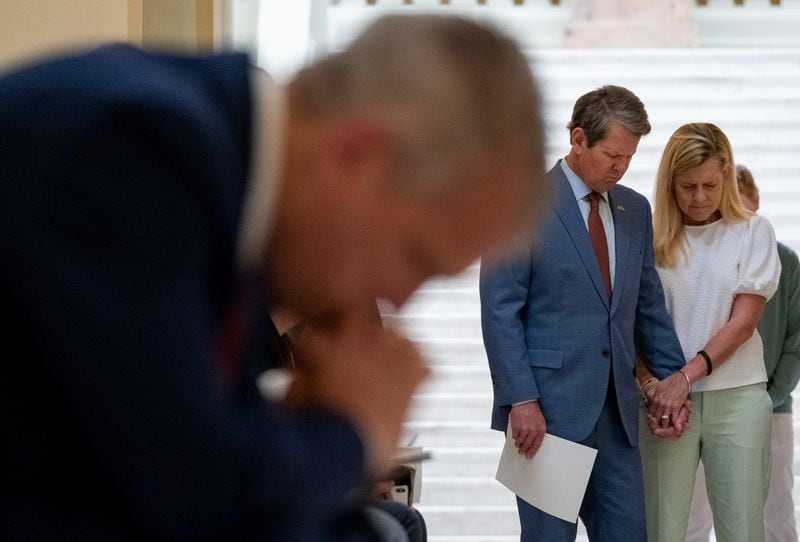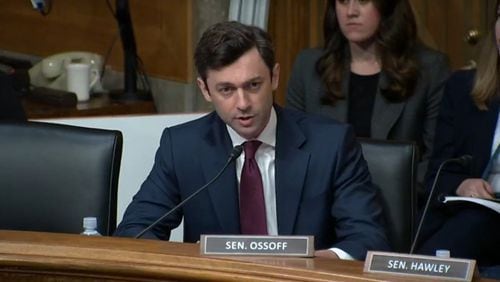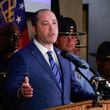Gov. Brian Kemp defended his handling of Georgia’s coronavirus outbreak on Monday, lashing out at the news media and others who questioned his decision to reopen segments of the state’s economy.
But Kemp took no issue with his most vocal critic: President Donald Trump. Twice last week, Trump lambasted Kemp during White House briefings for allowing the reopening of such businesses as tattoo parlors, gyms, and hair and nail salons.
Kemp spoke for the first time about Trump’s criticism during a news conference in the state Capitol, shortly before the state reported a new death toll that was rapidly approaching a grim milestone.
Hours earlier, Kemp had presided over a prayer service at which several pastors called for a Christian “revival” in Georgia. Both events took place the same day that the governor allowed restaurants to resume dine-in service and theaters to reopen — albeit with numerous restrictions.
Public health officials say that with the outbreak in Georgia still not at its peak, Kemp risked inviting a new wave of coronavirus infections.
When a reporter for NBC News asked Monday about the data supporting his decision, Kemp responded with an insult.
“I know it may be hard for NBC News to understand this, but all the data is available on the Department of Public Health website,” Kemp said. “I appreciate what the president’s doing. He said it best today — the media wants to continue to divide us.”
Moments later, Kemp’s public health commissioner, Dr. Kathleen Toomey, acknowledged that the state’s data did not show Georgia was meeting the Trump administration’s “full gating criteria” for reopening businesses. The federal guidelines call for new cases to decline for at least two consecutive weeks. But Toomey said Georgia was “approaching a plateauing,” even before it boosted testing capacity and opened additional hospital beds.
Kemp’s office has said it met other federal criteria allowing the state to move forward.
But the governor, Toomey said, based his decision on more than data.
“I respect his right to do that,” she said.
Monday evening, Toomey’s agency reported that 994 Georgians have died from COVID-19, the disease caused by the new coronavirus. That was an increase of 78 since Sunday.
As recently as Friday evening, the toll stood at 899. Total deaths have doubled in less than three weeks. Statewide, more than 24,000 coronavirus cases have been confirmed.
Just at nursing homes and other long-term care facilities, 432 residents have died since last month. A fast-moving outbreak has overwhelmed a Cobb County nursing home, PruittHealth-Marietta, where seven residents have died and 81 have tested positive for COVID-19. Three days earlier, the facility reported just two deaths and 44 positive tests. Its first case was confirmed April 10.
COMPLETE COVERAGE: CORONAVIRUS IN GEORGIA
At his news conference, Kemp tried to downplay his conflict with Trump, who reportedly had supported the plan to reopen certain businesses before criticizing.
It was “too soon” to reopen, Trump said Wednesday. Then, on Thursday, in an unusually personal rebuke, Trump repeatedly said he was “not happy with Brian Kemp,” implying the governor was not adequately protecting Georgians.
On Monday, Kemp disregarded a question about what Trump had told him in telephone conversations. He said only that he has worked “closely” with the White House.
“I appreciate his leadership,” Kemp said of the president. “I appreciate all the administration has done to support our state. The president and I believe in the same exact thing: we want to keep our citizens safe, and we want to reopen America.”
Following Trump's lead, Kemp complained about news coverage of his handling of the outbreak, specifically of lifting business restrictions. Many stories were "giving it a very hard time," he said, but then said his actions were merely symbolic because they affected relatively few businesses.
“What is the public supposed to think?” Kemp said. “You’re speaking out of both sides of your mouth.”
“Every decision I’ve made, I’ve had people criticizing me and people praising me,” he added. “I didn’t order anybody to reopen their business or to patronize any business. … These are tough decisions. It wasn’t a mandate. It simply gave people an opportunity to reopen.”
Kemp also criticized computer models that suggest Georgians remain at grave risk from the coronavirus. Those models also recommend that social-distancing measures remain in place well into June. He said Georgia would look better if not for “hot spots,” such as the Albany area, which has one of the highest rates of infection and death from the coronavirus in the nation.
“All models are wrong, but they’re useful,” Kemp said. “It’s like you almost get punished for taking a step, depending on what model you’re looking at.”
Kemp was among the last of the nation’s governors to issue social-distancing mandates and among the first to ease business restrictions, although more are doing so daily. Kemp’s shelter-at-home order expires at 11:59 p.m. Thursday, and he said he has not decided what restrictions might continue past then. He has ordered elderly Georgians and those who are medically fragile to stay home until at least May 13.
Earlier Monday, with many Georgians facing what he called “desperation,” Kemp convened a prayer meeting inside the Capitol, seeking divine intervention in the coronavirus outbreak. Seventeen faith leaders led prayers, each standing at a lectern adorned with Georgia’s state seal.
One of them, the Rev. Chris Moses of First Baptist Church of Cedartown, asked God for a “revival” that will “bring men and women and boys and girls to yourself through a relationship with your son, Jesus Christ.”
A few speakers took a more secular approach.
“We are desperate,” said Rabbi Ilan Feldman of Congregation Beth Israel in DeKalb County. “Our economy is in shambles. Our technology gives us no cure. People we love are sick or dying. We do not see a path out of this. And so we pray.”








